Crafting Decadent Chocolate Cake: A Culinary Journey
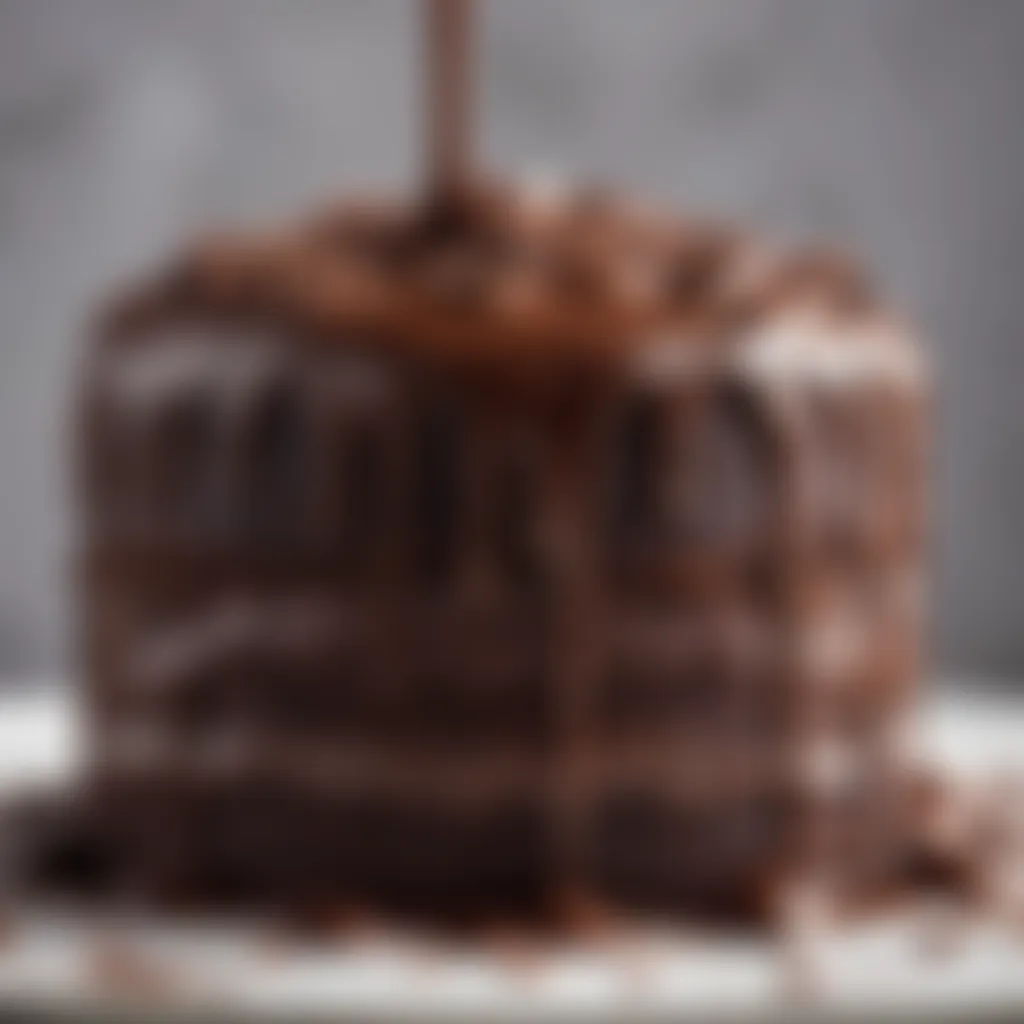
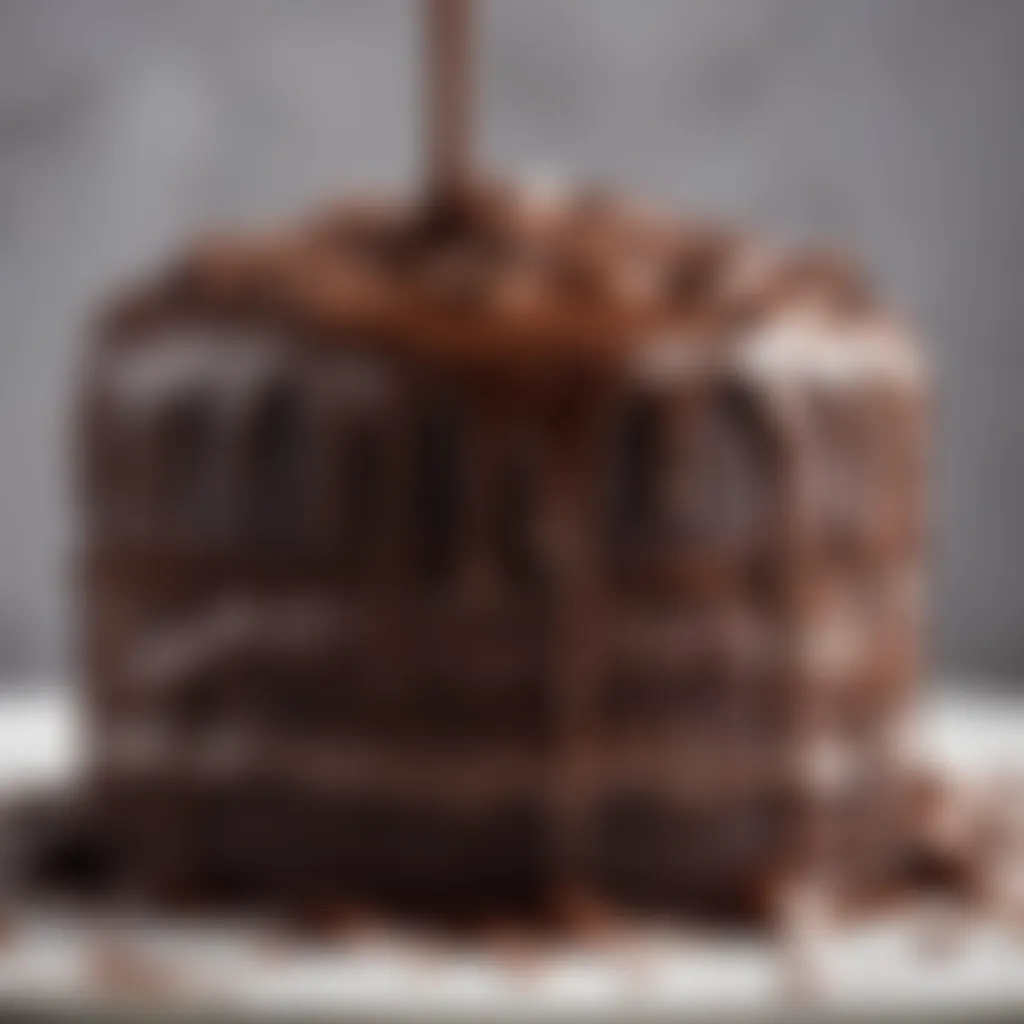
Intro
When one thinks of celebrations, memories often twirl around the delicious joy of desserts, and nothing quite matches the rich allure of a chocolate cake. It is not merely a dessert but a symbol of indulgence, love, and warmth. Families gather, friends laugh, and lovers unite over a slice of this velvety dream.
Chocolate cake has a history that stretches back centuries. From the ancient Mayans using cacao as a ceremonial drink to the Victorian era where it transformed into a beloved baked good, its evolution is as rich as its flavor. The basic components may seem simple—flour, sugar, cocoa powder—but when put together with care, they result in something transcendent.
In this article, we'll guide you through each step, so you not only master the recipe but also appreciate the history and science behind crafting a decadent chocolate cake. Whether you're baking for a birthday, an anniversary, or just because it’s Wednesday, this guide will ensure your baking skills shine brighter than the candles atop your cake.
Ingredients:
Creating the perfect chocolate cake begins with choosing the right ingredients. Here’s a comprehensive list to get you started:
- 1 3/4 cups all-purpose flour
- 3/4 cup unsweetened cocoa powder
- 2 cups granulated sugar
- 1 1/2 teaspoons baking powder
- 1 1/2 teaspoons baking soda
- 1 teaspoon salt
- 2 large eggs
- 1 cup whole milk
- 1/2 cup vegetable oil
- 2 teaspoons vanilla extract
- 1 cup boiling water
"Quality ingredients create quality outcomes. Always opt for the best ingredients you can find."
Preparation Steps:
Now that you have your ingredients laid out, it’s time to begin the journey of creating your cake. Follow these steps closely:
- Preheat your oven: Set it to 350°F (175°C). This allows for even baking.
- Prepare your cake pans: Grease and flour two 9-inch round cake pans. This prevents sticking, ensuring your masterpieces come out effortlessly.
- Mix the dry ingredients: In a large bowl, sift together the flour, cocoa powder, baking powder, baking soda, and salt. This step aerates the mix and combines flavors.
- Combine wet ingredients: In another bowl, whisk together the eggs, milk, oil, and vanilla until well blended.
- Combine both mixtures: Gradually add the wet ingredients to the dry mixture, stirring until just combined. Avoid overmixing.
- Incorporate boiling water: Stir in the boiling water carefully. This will thin out the batter and yield a moist cake.
- Divide the batter: Pour the batter evenly into the prepared pans.
Technical Aspects:
An essential part of baking is knowing the right technical details that ensure success. Pay close attention to these:
- Baking temperature: Always maintain your preheated oven at 350°F (175°C).
- Baking time: Allow your cakes to bake for about 30-35 minutes, or until a toothpick inserted into the center comes out clean.
- Cooling: Once baked, let the cakes cool in the pans for 10 minutes, then remove and cool completely on wire racks.
Cooking Process:
The cooking process translates a simple batter into something divine. The sequence is crucial:
- After the cakes cool, you can choose to level the tops gently if they have domed.
- Frosting: This is where you can get creative. Use a buttercream recipe or a ganache for a silkier finish.
- Assemble your cake: Layer the first cake with your chosen frosting, then place the second cake on top and frost the top and sides evenly.
- Decoration: You can garnish with chocolate shavings, fruit, or edible flowers for a personal touch.
Troubleshooting Tips:
Even the best bakers encounter hiccups, so here are some solutions to common mistakes:
- Cake sinking in the middle: This often happens from opening the oven too soon. Ensure you wait until the appropriate baking time.
- Dry cake: This can be from overbaking or not measuring ingredients precisely. Keep a close eye on the baking time, and invest in a kitchen scale if needed.
- Uneven layers: If your cakes aren't leveling, check if your oven heats evenly. A turntable oven can provide consistency.
The Essence of Chocolate Cake
The unmistakable allure of a chocolate cake is not merely found in its rich flavor and moist texture; it holds a deeper essence that resonates with the cultures and histories of countless societies. As we dive into the world of chocolate cake, it's essential to recognize its role beyond just a dessert. It serves as a symbol of celebration, comfort, and culinary artistry, embodying emotions and experiences that span generations.
Historical Context
The journey of chocolate cake begins centuries ago, tracing back to the introduction of chocolate to Europe. Originally consumed as a drink by the ancient Mesoamericans, it was not until the 19th century that chocolate began its transformation into the solid form we cherish today. The invention of cocoa powder and the subsequent rise of baking as a popular domestic pursuit coincided perfectly, paving the way for chocolate cakes to become a staple in the culinary narrative.
The chocolate cake we know today can be attributed to various innovations in culinary techniques and ingredient availability. For instance, during the Industrial Revolution, advancements in milling and processing made chocolate more accessible to the general public, which in turn led to a rise in chocolate-based desserts. Notably, the creation of the first chocolate layer cake in the late 1800s marked a significant milestone, allowing bakers to experiment with multiple layers and fillings, enriching the cake-making experience. Thus, chocolate cake evolved from a simple dessert to a sophisticated indulgence, often gracing tables during birthdays, weddings, and holiday gatherings.
Cultural Significance
Chocolate cake doesn't just fill the belly; it feeds the soul, acting as a cultural touchstone that brings people together. Different cultures have unique ways of interpreting this beloved dessert, from the rich, dense tortes of Europe to lighter sponge cakes found in other regions. In America, for instance, the classic fudgy chocolate cake has become synonymous with celebrations, embodying a sense of nostalgia that many carry into adulthood.
In many households, particularly in the U.S., baking a chocolate cake for a birthday is almost a rite of passage. This tradition goes beyond the act of baking; it represents love, care, and the desire to create joy through food. Humans have a special connection with chocolate; it’s seen not only as a treat but also as a source of comfort and pleasure. It's said that sharing chocolate cake can even bridge cultural gaps, making it a universal symbol of happiness.
"Baking together fosters connection and brings generations together around the same delicious tradition."
Overall, the essence of chocolate cake stretches across history and cultures, making it much more than just sugar and flour. It embodies the art of cooking, the science of baking, and the simplicity of togetherness, reminding us that some of life's most cherished memories can often be found in the kitchen.
Understanding Ingredients
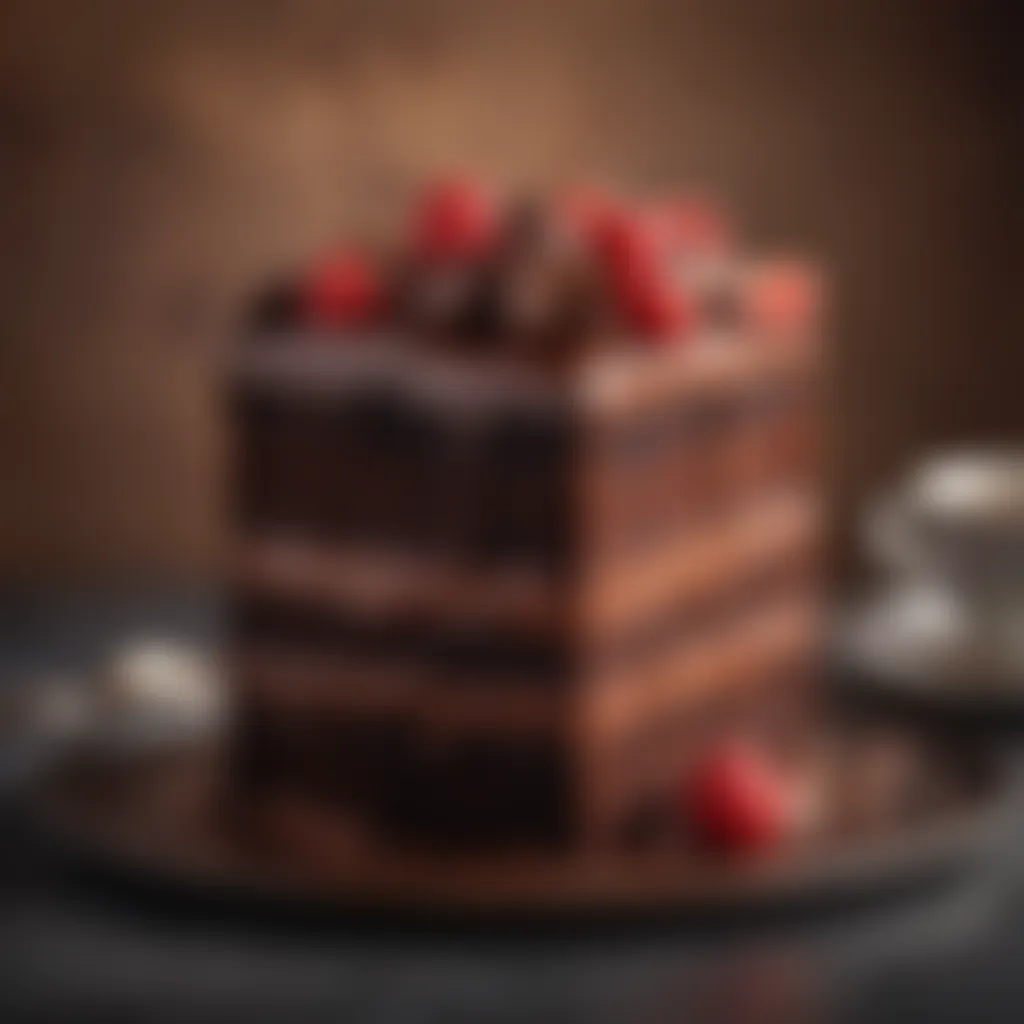

Ingredients in a chocolate cake go beyond mere components; they are the foundation of flavor, texture, and the very heart of this beloved dessert. Knowing what each ingredient does helps the baker to create a cake that is not only delicious but also has the desired consistency and structure. It's pivotal to understand each part and how they interact in the mixing bowl.
Cocoa: The Heart of the Cake
Cocoa powder is often regarded as the soul of a chocolate cake. It imparts the rich chocolate flavor that we crave. When selecting cocoa, one can choose between natural and Dutch-processed varieties. Natural cocoa is acidic and features a sharp taste, whereas Dutch-processed cocoa is treated with alkali to neutralize its acidity, resulting in a smoother flavor and darker hue.
Opting for good quality cocoa can elevate a cake from ordinary to extraordinary. It provides that deep, luscious color and essential chocolate notes that dance on the palate. Whether you are using it for flavoring or for the purpose of color, the heart of the cake often lies in this ingredient.
Flour Selection
All-purpose flour
All-purpose flour is the Swiss army knife of baking; it's versatile and reliable. This type of flour contains a moderate amount of protein, usually around 10-12%. This balance gives enough strength to create a structure without making the cake too dense. When you use all-purpose flour in your chocolate cake, you attain a tender crumb that holds up well to frosting and toppings. One of its distinct advantages is that it yields consistent results, which, let’s face it, is what every baker hopes for.
Nevertheless, it's worth mentioning that it lacks the nuances offered by specialty flours. This can mean sacrificing a hint of unique flavor the more specialized choices bring to the table.
Specialty flours
Specialty flours like cake flour or whole wheat flour can add a distinctive character to your cake. Cake flour, for instance, has a lower protein content, yielding a softer texture and finer crumb, perfect for that melt-in-your-mouth quality. This can be particularly beneficial if you’re attempting a moist chocolate cake, as it helps prevent that heavy feel.
On the flip side, using whole wheat flour could lend a nuttier flavor and more nutrition, but it might create denseness that some bakers aim to avoid. The choice here truly boils down to personal preference and the kind of end result desired.
Sugar and Its Role
Sugar does a lot more than sweeten the deal. It contributes to the texture and structure of the cake. When sugar is creamed with fats, it incorporates air and helps the cake rise during baking. Various types of sugar, such as granulated or brown sugar, can add different levels of moisture and flavor. Brown sugar, with its molasses content, will not only add sweetness but also render a richer taste that fits especially well within a chocolate cake.
Fats: Butter vs. Oil
Butter is renowned for its ability to create a rich flavor and a tender crumb due to the water and fat ratios. However, oil, being liquid, provides moisture and keeps the cake soft for a longer period. Some bakers might even choose to combine the two, using butter for flavor and oil for tenderness.
The choice between these fats can pivot on personal taste and desired cake characteristics. One isn’t necessarily better than the other; it just depends on the cake environment you hope to create.
Egg Chemistry
Eggs are not just a binding agent in a chocolate cake; their chemistry involves more than meets the eye. They add moisture and richness while also contributing to the leavening process. Beating eggs incorporates air, which means a lighter texture when the cake bakes. On the other hand, if you’re whipping it up for a sponge-like cake, separating the yolks and whites and whipping them individually could enhance the airy quality.
Liquid Ingredients
Water
Water plays a supporting role in your chocolate cake, melding the dry ingredients and helping activate certain reactions. The amount of water can dictate the cake’s density. Too much water, and you risk creating a very soggy result. In contrast, just enough helps maintain the right moisture levels.
Milk
Milk adds a certain creaminess and flavor depth. Whole milk can infuse richness, whereas skim milk may work in a pinch, but your cake might not be as luscious. Adding milk to your batter often leads to a more tender crumb, contributing to that velvety texture that every chocolate cake desires.
Coffee
Coffee is an ace in the hole that can intensify the chocolate flavor. As a liquid ingredient, it can enhance depth without leaving a coffee taste behind. When used sparingly, it can round out the cocoa experience, making it essential for any serious chocolate cake recipe.
While the ingredients might seem simple at first glance, their roles are integral to the success of your chocolate cake.
This exploration of ingredients brings a detailed understanding of what each brings to the table. Making informed choices here is key to not only achieving the dreamy indulgence wish, but also creating memorable experiences for those lucky enough to share in the treat.
Techniques for Perfection
When it comes to crafting the perfect chocolate cake, the difference between a good cake and a great one often lies in the techniques employed during its preparation. Mastering these methods not only enhances flavor but also affects the overall texture and appearance of the cake. By understanding the nuances of mixing, baking, and cooling, home bakers can achieve textures that are moist and flavors that are rich, ultimately leading to an indulgent dessert experience. In this section, we shall delve into essential techniques that can elevate your chocolate cake-making skills.
Mixing Methods
Creaming
Creaming is one of the most trusted mixing methods in baking. This technique involves beating softened butter with sugar until the mixture becomes light and fluffy. Why is this so important? Well, creaming helps incorporate air into the batter, contributing to a tender crumb in the finished cake. This process also allows for better flavor distribution throughout the cake. The key characteristic of creaming is its ability to aerate the fat, setting a solid foundation for the cake structure.
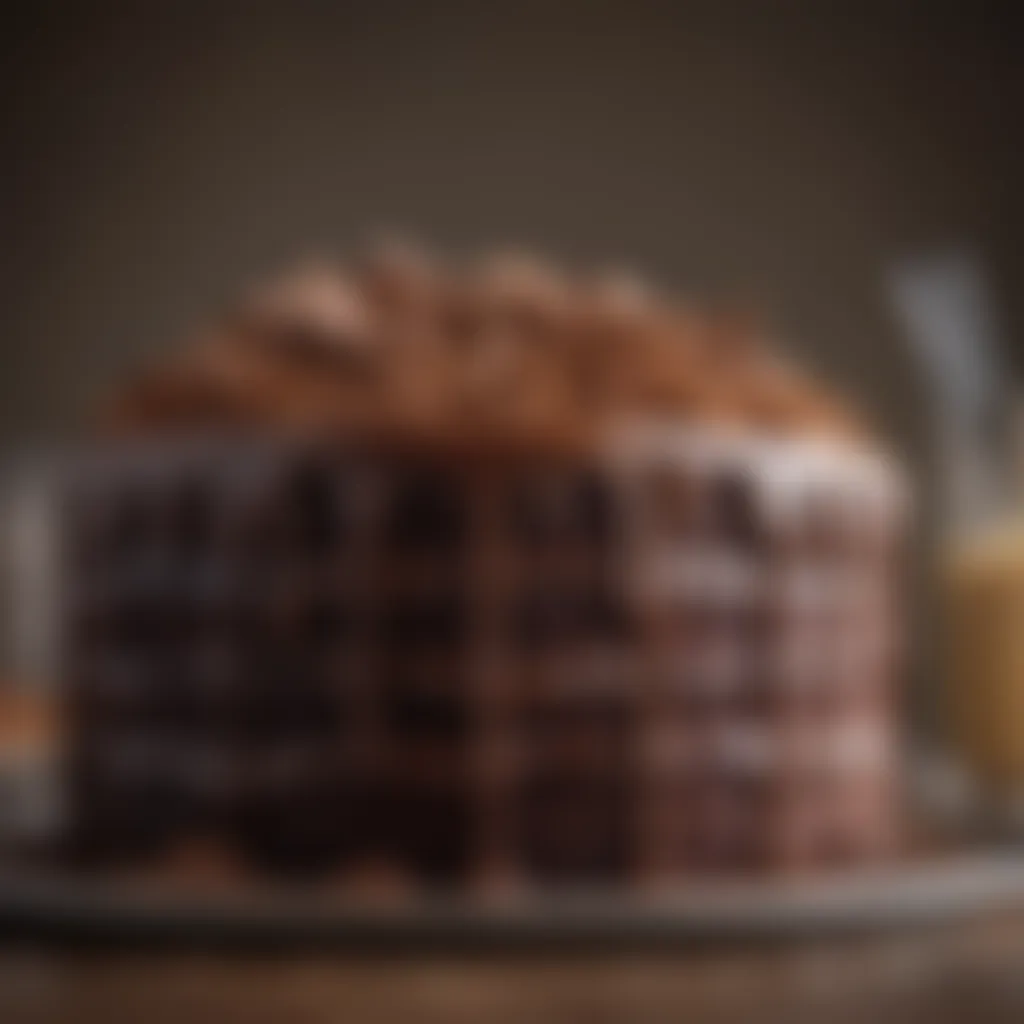

Creaming stands out as a popular choice in traditional recipes because it's a fundamental step in achieving that desired lightness. It is especially beneficial for those looking to create a beautifully risen chocolate cake. However, there's a caveat; over-creaming can lead to a cake that is dry. Therefore, timing is essential here—mix just until fluffy.
One-bowl method
On the flip side, we have the one-bowl method, which has gained quite a reputation among bakers for its simplicity. This technique allows all ingredients to be combined in a single bowl without any complex steps. It's a time-saver and brings ease to the baking process, making it a go-to for busy home bakers. The unique aspect of this method is its emphasis on quick mixing, leading to less mess and speedier preparation.
While it might not incorporate air to the same extent as the creaming technique, the one-bowl method can still produce moist and flavorful cakes, making it a beneficial choice for those pressed for time or seeking an uncomplicated approach. Just be cautious—if the ingredients aren't combined well, you might end up with lumps that affect not only the texture but also the overall pleasing aesthetic of your creation.
Baking Essentials
Oven temperature
The importance of precise oven temperature cannot be stressed enough in baking. Too hot, and you're likely to scorch the outside of your cake before the inside cooks. Too cool, and you'll end up with dense, undercooked layers. Keeping the oven at a consistent temperature ensures even baking, which is essential for achieving that cake that rises just right. Typically, recipes suggest a range between 325°F to 350°F—this allows for a proper rise and sets the structure beautifully.
A unique feature of oven temperature is that even slight variations can lead to drastically different outcomes. If you're using a fan-forced oven, adjust the temperature down by about 25°F to avoid abrupt cooking that can lead to dryness. Taking the time to preheat your oven can also make a world of difference.
Baking time
Baking time is the stopwatch of the baking world, determining whether you surrender to the sweet aroma of success or face the despair of an over-baked disaster. Each oven can behave differently, making it essential to start checking your cake a few minutes before the recipe suggests.
The key characteristic of baking time is precision. Relying on visual cues like a slightly domed top or the cake pulling away from the pan can guide you, but the best practice is to use the classic toothpick test—insert a toothpick into the center, if it comes out clean, it’s done. Remember, however, that a little lingering moisture can indicate a perfectly soft and delicious cake, so don’t be overly eager to pull it out.
Cooling and Its Importance
After working so hard to create the ideal cake, cooling may feel like a mere afterthought, but it is crucial. Cooling allows the cake to firm up, making it easier to handle when it comes time for frosting or serving. If one jumps the gun and frosts too soon, you run the risk of a melted mess. The cooling process gives flavor time to deepen and the texture to stabilize, culminating in the heavenly delight you aim to serve.
Cooling should be done on a wire rack, ensuring that air circulates around the cake. This prevents sogginess—a big no-no in the chocolate cake world. In essence, proper cooling can make all the difference between simply good and truly heavenly.
"Baking is an art, and techniques are the brushstrokes that create the masterpiece."
Following these techniques not only paves the path toward the perfect chocolate cake but also enhances one’s overall baking aptitude. With practice, anyone can master these nuances and create a decadent experience to be savored.
Frosting and Decoration
When it comes to cake making, the frosting and decoration serve as more than just visual appeal; they play a paramount role in the overall experience of indulging in a decadent chocolate cake. The right frosting caresses the palate, while thoughtful decorations enhance the aesthetic charm of the cake, making it a centerpiece at any gathering. This section covers various frosting styles and decoration choices, ensuring that your cake not only tastes divine but also tells a story through its presentation.
Classic Buttercream
Buttercream is perhaps the most common frosting found on cakes. Its creamy, rich texture makes it perfect for spreading and piping, giving it a versatility that home bakers adore. Made primarily of butter and powdered sugar, this frosting is also easily customizable with flavors such as vanilla, chocolate, or fruit extracts.
Why do we love classic buttercream? First off, it’s incredibly smooth, making it ideal for a clean finish on any cake. Its buttery richness beautifully complements chocolate, enhancing the deep flavors of cocoa. Not to mention, with just a few tricks up your sleeve, you can whip it into various shades and styles, catering to all kinds of themes. However, keep an eye on the temperature, as buttercream can melt quickly in warm conditions.
Ganache for Elegance
If you’re seeking a frosting that oozes elegance, ganache is your best friend. Made from equal parts chocolate and cream, this rich and glossy creation can be used to cover, fill, or drizzle over your cake. It stands out for its ability to provide a silky texture and deep flavor.
Ganache doesn’t just stop at being a frosting; its versatility spans from a decadent glaze to a whipped filling. When cooled, it achieves a thick consistency that can be piped with precision. Plus, the sheen of ganache creates a stunning visual effect, which means your chocolate cake will look as fabulous as it tastes. The downside? It takes a bit of patience to ensure the ganache is at the right temperature, so your eye must be keen.
Creative Toppings
A well-frosted cake might steal the show, but creative toppings bring it to life.
Chocolate shavings
Chocolate shavings are the cherry on top—well, in this case, the chocolate on top. They add a touch of dimension to the cake's surface and attract the eye with their delicate appearance. The key characteristic of chocolate shavings lies in their texture; they provide a luxurious crunch that complements the softness of the cake itself.
These beauties are a popular choice because they fit perfectly with the theme of a decadent chocolate cake. The unique feature of chocolate shavings is their ability to last longer on the cake without melting away, even in slightly warm conditions. However, one must be cautious; too many shavings can overshadow the cake's taste.
Fresh berries
Fresh berries introduce a vibrant pop of color and a refreshing tang that cuts through the richness of chocolate. The contrast between the sweet cake and tart berries enhances the overall flavor of the dessert, making this option both delicious and visually appealing.
Ripe strawberries, blueberries, or raspberries not only create a beautiful decoration but also add nutrients, which is a boon for anyone looking to enjoy dessert with a little bit of health consciousness. The unique feature of fresh berries is that they can be arranged artistically, giving an homely, rustic feel to your cake. The downside? They can spoil quickly, so it’s best to add them just before serving to avoid any mishaps.
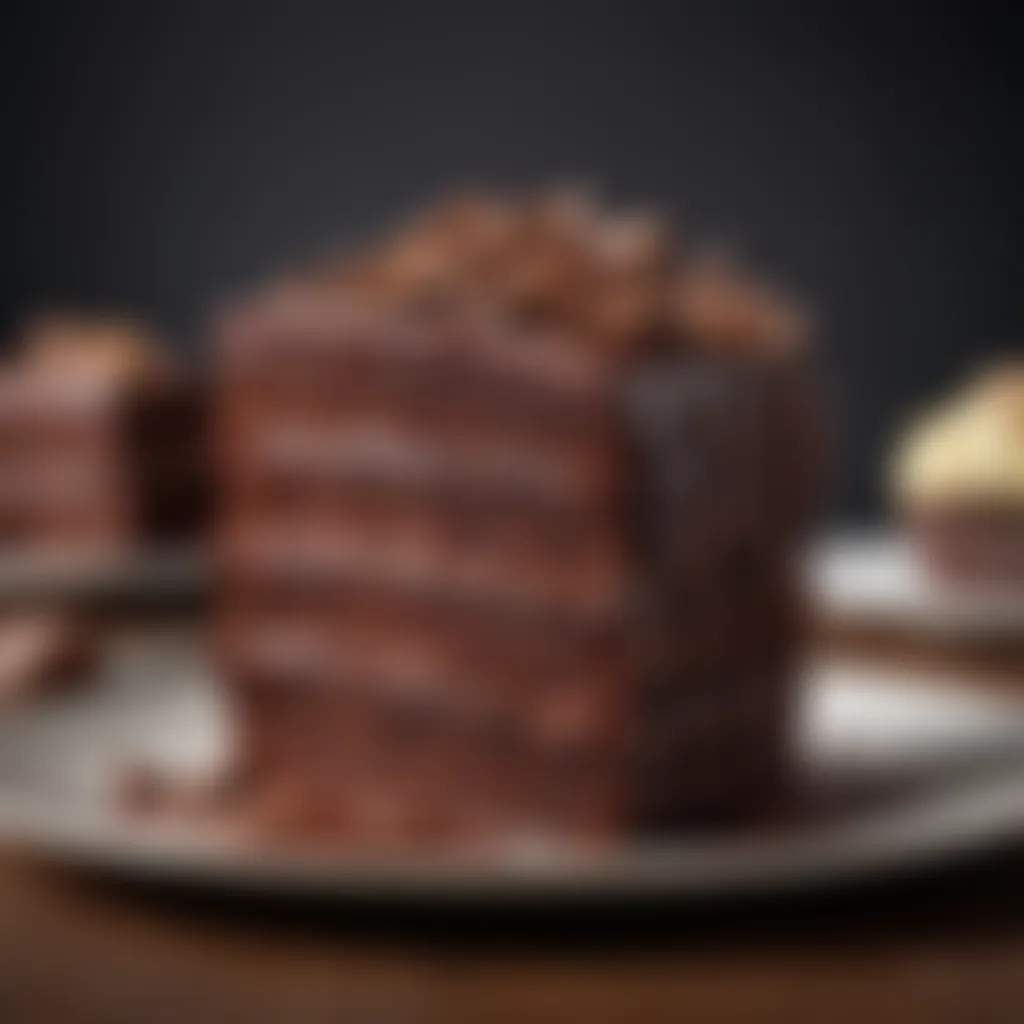

Whether it's the rich decadence of ganache or the traditional charm of buttercream, the choice of frosting and decoration is vital in crafting your chocolate cake masterpiece.
By carefully considering your frosting and decorative choices, your chocolate cake can seamlessly combine taste and charm, creating a delightful experience for anyone lucky enough to savor it.
Exploring Variations
When it comes to decadent chocolate cake, the art of exploring variations adds another layer of enchantment to the culinary journey. By stepping beyond the classic recipe, home bakers can introduce a range of textures, flavors, and dietary adaptations that cater to diverse palates. This broader approach not only enhances the overall cake experience but also invites creativity into the kitchen.
One of the key benefits of exploring variations is inclusivity. Not everyone can enjoy traditional chocolate cake due to dietary restrictions. By diversifying recipes to accommodate gluten-free and vegan options, bakers can ensure that no one misses out on this beloved dessert. Moreover, variations can reflect personal culinary preferences or seasonal ingredients, making every cake a unique creation reflective of the baker’s style and values.
Gluten-Free Options
Gluten-free baking presents its own set of challenges but offers a fabulous opportunity for those sensitive to gluten. Rather than borrowing from typical wheat flours, many turn to alternatives such as almond flour, coconut flour, or even a ready-made gluten-free flour blend. These options carry different flavor profiles and textures, so it’s important to play around to find what suits your palate.
A secret tip is to blend different flours to achieve the desired cake structure. For instance, mixing gluten-free all-purpose flour with a bit of almond flour can increase moisture and richness.
Vegan Adaptations
For those considering a more plant-based approach, vegan chocolate cake is a thrilling direction to take. Instead of eggs, popular substitutes like flaxseed meal or applesauce can do the trick. These ingredients add moisture and bind the cake similarly to eggs.
In terms of dairy, swapping out regular milk for almond, soy, or oat milk provides a creamy texture while keeping the cake vegan-friendly. Some bakers even like to experiment with aquafaba, the liquid from a can of chickpeas, which can be whipped and used in place of eggs, bringing an astonishing lightness to the cake.
Flavor Infusions
Mint Chocolate
Mint chocolate is a classic combination that brings coolness and refreshment to the rich, dense characteristics of chocolate cake. The invigorating notes from mint can balance the sweetness, making this flavor infusion a crowd-pleaser, particularly in warmer seasons. One can accomplish this by adding peppermint extract in the batter or using fresh mint in the frosting.
The key characteristic of mint chocolate is its refreshing taste, transforming the cake into an indulgence that's also invigorating. However, it is important to be moderate with mint’s boldness, as too much can easily overpower the chocolate's warmth, making it a delicate balancing act.
Orange Zest
Another delightful choice is orange zest, which adds a citrusy brightness to the cake. Incorporating orange zest introduces a vibrant flavor that complements the chocolate well. Its key characteristic lies in enhancing the cake's aroma alongside its flavor, providing a pleasant contrast to the rich chocolate.
The unique feature of orange zest is its aroma and slight acidity, which elevates the dessert experience. While it brings numerous advantages, the cautious baker must consider that too much can lend an overly citrusy flavor, possibly straying away from the beloved rich chocolate experience.
Exploring variations allows bakers to embrace creativity and adaptability, making every chocolate cake unique to both the season and the individual preferences.
Embracing these variations doesn't just enhance the taste but also broadens the audience that can indulge in such a rich and emotional experience as a decadent chocolate cake.
Serving and Enjoyment
The final act in the creation of a decadent chocolate cake is not merely about how the cake tastes; it’s equally about how it’s presented and savored. The act of serving the cake can elevate the entire experience from ordinary to extraordinary. A well-served cake can evoke emotions, create memories, and turn a simple occasion into a significant celebration. Attention to how the cake is served becomes essential, as it sets the tone for the enjoyment that follows. This underlines the cake's role not just as a dessert but as a centerpiece in gatherings, be it a birthday, anniversary, or simply a cozy family dinner.
Inviting people to share a slice is an invitation to indulge in a moment of happiness. When one thinks of enjoyment, the first step is often the presentation, which can spark interest and entice your guests even before they taste a morsel.
Pairing with Beverages
Coffee
Pairing chocolate cake with coffee is a match made in heaven. The intense flavor of coffee complements the rich, sweet notes of the chocolate, creating a harmonious balance. For those who appreciate the depth of flavor, a well-brewed cup of coffee offers subtle hints of bitterness that can enhance the cake's sweetness. It's more than just a drink; coffee has the ability to cleanse the palate, preparing you for each decadent bite.
One key characteristic of coffee is its versatility. You can opt for a dark roast, which adds robustness, or perhaps a lighter brew that provides a refreshing contrast. Whether you prefer a smoky French roast or a fruity Ethiopian blend, coffee can indeed elevate your chocolate cake experience. However, it’s worth noting that a too-strong coffee could sometimes overpower the delicate flavors of a finely crafted cake, so balance is the name of the game.
"The secret to pairing chocolate cake with coffee lies in finding that perfect roast, one that whispers not shouts."
Red Wine
On the other hand, red wine offers a different layer of sophistication when paired with chocolate cake. The tannins in red wine actually interact well with the chocolate’s richness, often bringing out complex flavor notes that otherwise might go unnoticed. A medium-bodied Merlot or a fruity Pinot Noir can ignite the chocolate’s flavor profile beautifully, unfolding layers of sweetness and acidity that make for a delightful tasting journey.
A unique feature of red wine is its ability to bring warmth to the table. This cozy feel is undoubtedly appealing, especially during gatherings in cooler seasons. However, one must tread lightly; not every wine will mesh seamlessly. Opting for lighter wines can brighten the experience, while heavy-bodied varietals might sometimes clash with the cake's sweetness.
Presentation Techniques
Creating an eye-catching presentation is just as crucial as the cake's flavor. How you present your cake can make all the difference, tipping it from merely delicious to visually inviting. Here are some techniques to elevate your cake’s appearance:
- Use Cake Stands: Elevating your cake on a stand adds drama and importance, making it a perfect centerpiece.
- Garnish Thoughtfully: Fresh berries or a dusting of powdered sugar can bring color and texture to your cake, making it more appealing.
- Layering: For those adventurous at heart, try a tiered cake design. This not only looks impressive but also allows for varied flavors in each layer.
- Add a Personal Touch: Little decorations or themed accessories related to the occasion can personalize the cake, making it special for the moment.
Focusing on these aspects not only showcases your baking skills but also enhances the overall experience of enjoying a decadent chocolate cake.







